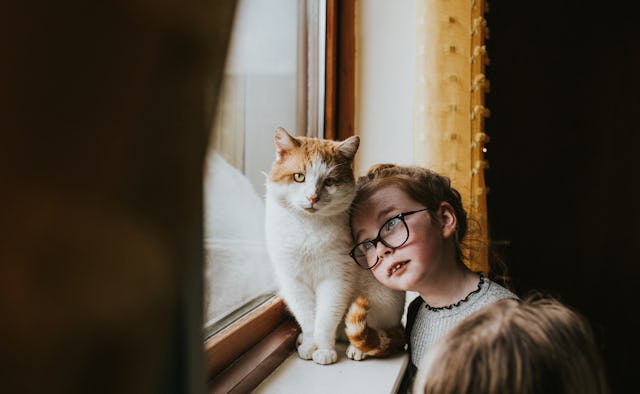How Long Do Cats Live? If You’re Thinking Of Adding A Feline To Your Family, Start Here
It's a big commitment, says veterinarian Dr. Megan Conrad.

Your little one has begged you long enough — it's time to adopt a kitten and welcome some furry cuteness into the family. But have you ever really considered how long cats live? Before you make an appointment at your local animal shelter, it's a good idea to assess whether or not you're ready to take on the longevity of a cat.
When I first picked up my cat, Olive, from the shelter a few years back, I looked into her big, green eyes and said, "Well, this will be an interesting 15-20 years." I'm 40 now, and I find it fascinating (and a little overwhelming) that we will be living out midlife together. That's the thing about cats — unlike, say, a hamster or a goldfish, they live a long time. The longest-living cat on record, Creme Puff, died at 38 years old in 2005. At 27 years old, Flossie is currently the oldest living cat.
See? Cats are an investment. And while they typically don't live quite as long as Creme Puff or Flossie, veterinarian Dr. Megan Conrad says there are some things you should understand about how long a cat could be a part of the fam.
How long do cats live?
"The average lifespan for a cat can range anywhere from 10-16 years though this can vary depending on the cat's lifestyle and underlying medical conditions," Conrad tells Scary Mommy. "Some cats can live up to 19-20 years old. The oldest I met was 25!"
Why do cats live longer than dogs on average?
So, why do cats typically live longer than dogs? "There are theories behind the reasoning, but some reasons they may live longer are their survival instincts are sharper, and in general, most cats are fairly similar in build and overall size (with a few exceptions)," Conrad explains. "What I mean is that dogs come in a very wide variety of shapes and sizes (for example, pug vs. Great Dane), and with all the variety comes a number of health problems. Some cat breeds are known for their issues, but for the most part, your average domestic cat is a mix of all kinds of things and therefore tends to be hardier."
What affects how long a cat will live?
Lifestyle is a big one, says Conrad. "Indoor cats, on average, live four to five years longer than outdoor cats due to the lack of threats they have indoors, such as cars and wildlife," she explains. "Cats with underlying medical issues such as renal disease, diabetes or hyperthyroidism can sometimes live shorter lives depending on how early it is diagnosed."
Some common illnesses cats can contract that can affect their longevity include parasites (fleas, intestinal worms, etc.) which can be passed around to other animals if not treated. According to Conrad, FeLV and FIV are fairly common contagious viral diseases passed through bodily fluids such as saliva and blood. Additionally, the most common conditions she sees in elderly cats are renal disease, hyperthyroidism, arthritis, and cancer.
Why is longevity so vital to consider before adopting a cat into your family?
Before you make it official and bring your little ball of fur into your home, Conrad advises you to really think it over since cats do live such a long time.
"Cats, on average, are a 13-15 year commitment," she says. "Thinking ahead of what your lifestyle might be in those coming years is important, including if starting a family may be a factor. For example, how will Kitty do with a new baby? Or if traveling is something you may be doing frequently. Though cats are generally more low maintenance than dogs, they still require care and can develop conditions later in life that should be considered when thinking of bringing a cat into your family."